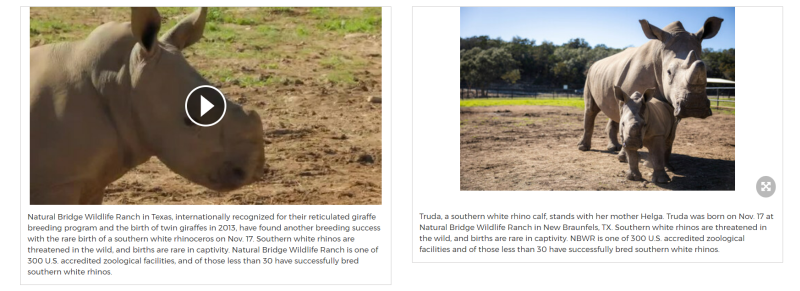NEWS PROVIDED BY
03 Jan, 2024, 09:00 ET
Southern white rhinoceroses are threatened in the wild, births rare in captivity
NEW BRAUNFELS, Texas, Jan. 3, 2024 /PRNewswire/ -- Natural Bridge Wildlife Ranch, internationally recognized for their successful reticulated giraffe breeding program and the birth of twin giraffes in 2013, have found another breeding success with the rare birth of a southern white rhinoceros on November 17.
The healthy and rapidly growing, robust female southern white rhino calf Truda is the first offspring of female Helga and male Kutu. At birth Truda weighed about 125 pounds.
"Truda's birth is a first for the ranch, and it was simply amazing to witness due to the species peril in the wild," said Natural Bridge Wildlife Ranch (NBWR) Animal Husbandry Director Tiffany Soecthing.
The International Union for Conservation of Nature and Natural Resources (IUCN) lists the southern white rhino as a near threatened species due to poaching threats and illegal trafficking of rhino horn. Currently, a rhino dies every eight hours in South Africa from poaching.
"It's an incredible honor to contribute to the southern white rhinoceros conservation efforts worldwide. We have been working towards this for over 20 years," said Soechting.
NBWR is one of 300 accredited zoological facilities in the United States and of those less than 30 have successfully bred southern white rhinos.
"Rhino numbers have been declining in the wild in the last decade at an alarming rate and while intensive and extensively kept rhino breeding programs exist, most of them fail due to behavioral capabilities and low infertility," said Dr. Stephen Momberg, a wildlife expert and veterinarian in Mid Wales, UK, who actively studies rhino habitat in his native South Africa.
"The birth of Truda at Natural Bridge Wildlife Ranch is significant for conservation efforts, as it not only increases the population of rhino but hopefully one day will help in addressing the demographic imbalances in their home ranges," added Momberg.
Soechting and her team at NBWR have been working with animal conservation experts from around the world to aid in projects that ensure the longevity of rhino and giraffe in the wild including Dr. Francois Deacon, a wildlife habitat expert, and lecturer at the University of the Free State South Africa. Deacon leads multiple animal conservation research efforts including an interdisciplinary project on the Ecological and biological factors regulating rhino.
"Living my whole life in Africa amongst these marvelous creatures, I realized that the only way to save them is to create a haven for them away from Africa," said Deacon. "For the survival of the species, a newborn calf in captivity is highly significant. I applaud the Wildlife Ranch for their dedication and efforts in helping save rhino for our children to witness in the future."
There are roughly 16,800 southern white rhinoceros left in the wild living in 11 African countries with the largest wild populations in their native South Africa, including Kruger National Park and Hluhluwe-iMfolozi Park, but also in numerous state-protected areas and private reserves throughout the country.
In the early 1900's there were fewer than 100 southern white rhinos. Their number gradually increased over the last century due to intense, collaborative conservation efforts. In 2012 their numbers began to decrease by an alarming 25 percent due to poaching, even with the vigilance of ranger patrols and private facilities that spend millions of dollars in efforts to protect.
"We're thrilled to learn of Truda's birth," said International Rhino Foundation Executive Nina Fascione. "With all five rhino species imperiled, every rhino birth is important and conservation breeding programs like that at Natural Bridge Wildlife Ranch complement the hard work being conducted to conserve them in the wild."
NBWR is a zoo partner of the International Rhino Foundation and supports their efforts to protect all 5 rhinoceros' species, including the 3 Asian species and the black and white rhinos in Africa. All have some level of endangerment designated by IUCN.
"We are committed to NEVER seeing the southern white population dwindle like the northern whites. There are only 2 surviving females of that sub-species," said Soechting.
About Natural Bridge Wildlife Ranch
Opened in 1984, Natural Bridge Wildlife Ranch has become one of Texas' most recognized entertainment attractions and leaders in animal conservation. Internationally recognized for rare twin giraffe births in 2013, the ranch's successful giraffe breeding program has aided in the awareness and conservation of giraffe in the wild.
Designated as a Texas Land Heritage property, the same family has operated the ranch for close to 140 years. The Ranch covers 450 acres of Texas hill country terrain and provides 6 miles of paved roads where guests drive through and witness the natural animal behaviors of over 800 animals from over 40 exotic, native and endangered animal species worldwide. The natural, free-roaming environment is home to many unique animals, including the southern white rhinoceros, reticulated giraffe, addax, scimitar-horned oryx, American bison, aoudad, bongo, dama gazelle, gibbon, ring-tailed lemur, as well as many zebras, emus, ostriches, and wildebeests. For more information, visit www.WildlifeRanchTexas.com.
SOURCE Natural Bridge Wildlife Ranch
